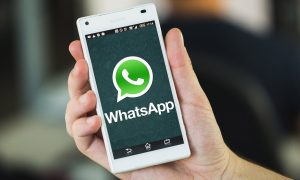This week marks the 10th birthday of Facebook Messenger, which was launched as a separate app back in 2011 as part of Facebook’s broader push to dominate the social communications space.
Though, in fairness, people only really started to care about Messenger in 2014, when Facebook forced users to download its separate messaging app by removing its messaging options from Facebook proper. Since then, however, Messenger has gone from strength to strength, adding millions more users and becoming one of the three biggest messaging platforms in the world, alongside WhatsApp (also owned by Facebook) and WeChat.
The app has gone through a lot of change in its first decade, and to mark the milestone, Facebook has announced a range of new Messenger features, designed to both spark a celebratory mood, while also adding entirely new functionality to prompt further messaging interaction and usage.
First off, Facebook’s adding new Poll Games in Messenger, an interactive polling option that enables you to find out new things about your friends.

As explained by Facebook:
“You can now play “Most likely to” in polls to help you discover what your friends really think about topics like who is “most likely to give gifts on their own birthday?”, “most likely to fight zombies while everyone else runs away?” and “most likely to miss their flight?️”
You can also write your own prompt for your poll – which will doubt lead to varying levels of tension and angst. But it’s another option to help boost engagement within Messenger chats, and it could be a fun idea to spark discussion in your groups.
“To play a poll game in your group chat, tap “Polls” and select the “Most Likely To” tab to pick a question and select the names of chat participants to be included as potential answers.”
Facebook’s also adding a new way to share Facebook contacts with friends through Messenger.

The process is fairly straightforward:
“Simply select the contact you want to share, access the chat settings and tap “Share Contact” under the “More Actions” section.”
That could make it easier to connect people through the app, and refer people for business, providing potential networking benefits.
Facebook’s also taking the opportunity to preview its coming Word Effects option, “an exciting new way to pair words with the emojis that have meaning to you and your friends”.

As you can see in this example, Word Effects will enable you to choose an emoji to be paired with a certain word or term, which will then spark an on-screen explosion of that emoji character whenever it’s used within your chat. Which could get annoying, but it might also be an interesting way to spice up your group chats, and highlight specific terms that have special meaning to you and your friends.
Word Effects will be coming to Messenger in the near future.
Facebook’s also adding a new birthday gifting option for payments in Messenger, which delivers your money transfer with new wrapping paper and virtual balloon effects, as well as a Birthday chat theme and 360 background, linking into the celebratory tone. It’s also adding a birthday song Soundmoji and new effects for messages.

Facebook’s also launched a “Messenger is 10!” sticker pack, if you’re overly keen on celebrating the app’s longevity.
And finally, Facebook has also shared some insights into key Messenger milestones – which, among other things, shows that voice notes are at an all-time high this year.

Maybe the lockdowns have made us miss hearing other people speak, or maybe it’s part of the broader audio social trend. Either way, some interesting insights into Messenger use over time, and the key trends that have influenced the app’s development.
It’s difficult to measure the relative success of Messenger’s first decade, when you consider its varying shifts.
As noted, Messenger usage surged only after Facebook forced users to take their private chats across to the app, which inflated its popularity from the outset, and while it has since remained a key connection tool, Facebook’s efforts to expand its functionality – through Messenger Bots, Games, Stories and other functions – have largely fallen short.
Over time, Facebook has struggled to effectively monetize the app, because users are not overly welcoming of ads in their private spaces (see also: WhatsApp), while it’s also been forced to scale back its additions to avoid crowding the UI and turning people away.
And while Messenger does have 1.3 billion active users, it reached that milestone back in 2017. Facebook hasn’t provided an updated usage stat since.
Does that mean Messenger has plateaued, and people are switching to other messaging options instead, like Instagram Direct or WhatsApp? Overall, Facebook’s ‘Family of Apps’ (Facebook, Messenger, Instagram and WhatsApp) are sitting on 3.5 billion monthly actives, and rising, so it’s not like Facebook’s at risk of losing its grip on its audience. But it does seem like it’s lost some momentum, with Messenger, in particular, seeming to now have a little less steam.
Given this, it’s hard to also predict what the future holds for the app. Messenger remains a critical connection option for many, but the increased push towards improved data privacy doesn’t bode well for the app – even with its recent addition of more end-to-end encryption options.
Maybe, then, Facebook’s push to integrate its messaging apps is as much about solidifying its hold on messaging as it is about improving functionality. By merging its two big messaging apps, Facebook can build a huge, inter-connected messaging network, which benefits from the western market presence of Messenger, and the higher security of, and user trust in WhatsApp.
The risk is that WhatsApp’s reputation for security takes a hit – as it did earlier this year when Facebook announced a change to its Privacy Policy. But maybe, if Facebook can weather that, it will be able to solidify both apps as key utilities for more users moving forward.





































